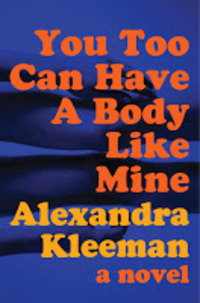
Our series of guest posts by writers of fiction, history, essays, and poetry continues today with a contribution from Alexandra Kleeman, whose just-published debut novel You Too Can Have a Body Like Mine, a seriocomic foray into consumerism and a uniquely contemporary kind of anomie, is drawing comparisons to DeLillo and Pynchon and, in the words of a Slate reviewer, “may be our best novel about the weirdness of being female in a culture that is obsessed with women’s bodies.” Below, Kleeman shares some of her formative influences as a writer.
VALIS, Philip K. Dick. People often think of Dick as a bad writer with an amazing set of concepts he’s trying to convey, but it’s not until you try to perform a Dickian act of narrative inversion or reality-shifting that you see how much skill and craft goes into what can look superficially like clunky writing. VALIS aims to make the reader perceive distinct entities as existentially or spiritually unitary—beneath surface differences lies a gnostic equivalence. Hence VALIS’s unfortunately-named protagonist Horselover Fat (an etymological equivalent for Philip K. Dick’s own name) can have a friend named Phil Dick, and later discover that he and Phil Dick are one and the same person. It would be easier (though still somewhat impossible) to tell this story from the outside, narrating and explaining this discovery. But Dick embeds you in Horselover Fat’s consciousness, forcing you to experience the contradictions of this gnostic logic as a visceral assault on your own individuality. It’s one of the strangest and most mysterious books out there, and I think it’s more radical in its structure than Pynchon or DeLillo because Dick allows not just inconsistencies but full-blown paradoxes to crop up in his world. The reader becomes a site for the resolution of these unresolvables, the effect often being that you find yourself thinking an impossible thing that you’ve never thought before, or experiencing something that feels like it could tear you in half.
Letters to Wendy’s, Joe Wenderoth. This book takes the form a series of direct-address poems written on [the fast-food restaurant] Wendy’s comment cards—a uniquely modern constraint on composition if there ever was one. Shifting between exhortation, reflection, abuse, Wenderoth did a sort of postmodern take on “Thirteen Ways of Looking at a Blackbird”—you could call it “500 Ways That Wendy’s Looks Back at You.” Lines like “People eating toward eternity! People looking nice toward eternity! It is terrible to be real, I know, but it is more terrible to be long” abut vivid descriptions of ground meat and factory farming. Wenderoth challenges the idea that the American lyric voice died with the obsolesce of the circumstances and landscapes that gave birth to it originally: in his poems there are pathos, tenderness, rage, and above all 100% real emotion, not from concentrate. I first read these when I was eighteen, and they rooted in me a belief that the unexceptional suburban places that surrounded me were not boring and sterile even though they were built to be—there was ample emotion, only that emotion was made wilder and stranger because it couldn’t find a place to settle itself.
The Member of the Wedding, Carson McCullers. A slew of books and movies out there aim to represent the transitional point at which the world stops engaging with you as a girl and begins engaging you, whether you like it or not, as a woman. None of them do it as well as Carson McCullers does. Frankie Addams is a twelve-year-old tomboy who “wishes that people could change back and forth from boys to girls”—we follow her over the course of a few days as she fantasizes about leaving town with her brother and his new bride, who are due to get married and then go on a honeymoon. By the end of the book, she’s narrowly escaped a disturbing encounter with a soldier and has learned what the reader knew all along: Her life is fixed insofar as her gender is fixed. She’ll learn to navigate the world with her newly sexualized body, she’ll learn unpleasant lessons about other people, she’ll age and if she does leave town it’s likely to be through a conventional, gendered channel rather than the escape she had imagined with her brother and his new wife, in a role she had dreamed up herself. This is a dark book, but funny, and true to a form of becoming a woman that I’ve known myself.
Breakfast of Champions, or Goodbye Blue Monday, Kurt Vonnegut. Vonnegut is a good prescription for anyone who’s suffering from loneliness or sadness, which is why I read him in high school and why I consider him something like a personal friend to this day, even though obviously we never met. What he does so well in this book is depict people who are alone in their loneliness, together. Dwayne Hoover is a successful car salesman who’s on the brink of going insane and just looking for the right idea to fixate upon, Kilgore Trout is a published but more or less ignored author with a fictional premise that will end up driving Hoover mad. Threaded through their story are victims of racism and injustice, syphilitic microbes, cows and the hamburgers they are made into. From the perspective of narrator or reader, the sadness of each of these individual characters becomes visible as a sad but sympathetic web that connects us all invisibly. Even if the problems are terrible and unresolved, Vonnegut gives you a taste of what it’s like to empathize not just with individual others, but for the whole painful system.
Empathy, Mei-mei Berssenbrugge. This is the poetry that I open up whenever I want to feel calmer and wiser, or like I am with a calm wise friend whose emotions absorb me while allowing me to be myself, separate. These are intricately detailed etchings of an internal landscape, or a seismograph registering the peak and fall of one single emotional thread. Everything in them is an analogue for feeling, or every feeling in them is an analogue for unadulterated space and air and light. I love this book too much.
—from “Honeymoon”
Alexandra Kleeman’s fiction has been published in The Paris Review, Zoetrope: All-Story, Conjunctions, Guernica, and Gulf Coast, among others, while her nonfiction has appeared in Tin House, n+1, and The Guardian. Vogue has praised You Too Can Have a Body Like Mine as “Fight Club for girls,” while the Chicago Tribune called it “a satirical and searing critique of modern-day womanhood.”



